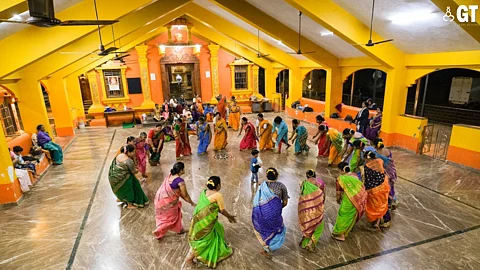

With the onset of winter, somewhere in the month of January, the maand and temple premises of Goa come alive with songs and chants, as women dance to the beat of the Dhalo.
In order to better understand what drives these Hindu women of Goa to keep this practice alive, we travelled to the interiors of Sarvan village, in Bicholim taluka.
As the night began to fall, the temperature slowly dropped. In spite of the winter chills, the women of Sarvan excitedly gathered at the temple premises to perform the annual folk dance, Dhalo.
ONLY WOMEN DO IT!
The Dhalo is a type of folk dance and singing, which is performed solely by women. During the Hindu month of Pausha, during the full moon, for seven days these women dance and sing throughout the night, evoking blessings, narrating stories, expressing themselves and more.
EXPRESS THEMSELVES THROUGH 'DHALO'
Sundari Laxman Sawant, a 65-year-old resident of Sarvan, Bicholim, tells us what happens during the Dhalo. She says that on the first day, there is chanting and evocation. During this time, the maand is also prepared for the upcoming seven days.
"Women come together, sing and dance. They express themselves through stories, seeking blessings for their families and moreover, enjoy that phase with other women from the village," says she.
For these women, these seven days are a mix of fun, entertainment and prayer. They wholeheartedly take part and follow the rituals and customary practices that are associated with Dhalo.
SEVEN DAYS OF DHALO
It is not just the old, but also the young women and girls who take an active part, without missing any of the events of the seven days. Interestingly, if they miss a day, they are bound by certain rules – they have to pay a fine, if they miss one day or fail to wear the Nauvari saree!
On the other hand, many young kids can be seen running around the premises, while other children watch their mothers curiously and slowly try to imitate the older women.
DHALO DANCE
During Dhalo, you find women dancing together in two parallel rows, facing each other and with interlocked arms. As they sing, they also perform the Fugdi and other Dhalo dances.
YOUNGSTERS WILL TAKE IT FORWARD
Radabhai Narayan Sawant, a 65-year-old woman from Sarvan, says that if the Dhalo has to continue, it will be done through these young girls who are actively involved in Dhalo.
"No matter how modern these young girls are, we've seen them grow and take part in all these activities, and we know that they will take Dhalo forward to the next generation, and we are always here to guide them."
Most of these women are housewives, while some are employed. And, in spite of having work the next day, they don't mind staying up all night to part take in the traditional Dhalo.
For these women, it is seven days of bonding with their women neighbours and family members, and share their struggles and stories with them.
It is impossible to find men at the maand as most of them are either sleeping in their homes or catching up with other men, while the women folks are out enjoying their time during Dhalo.
And, this folk art isn't unique to Sarvan village alone. In various other parts of Goa, too, women perform Dhalo on all seven days without fail and that is how this tradition is being kept alive and passed from one generation to the next.